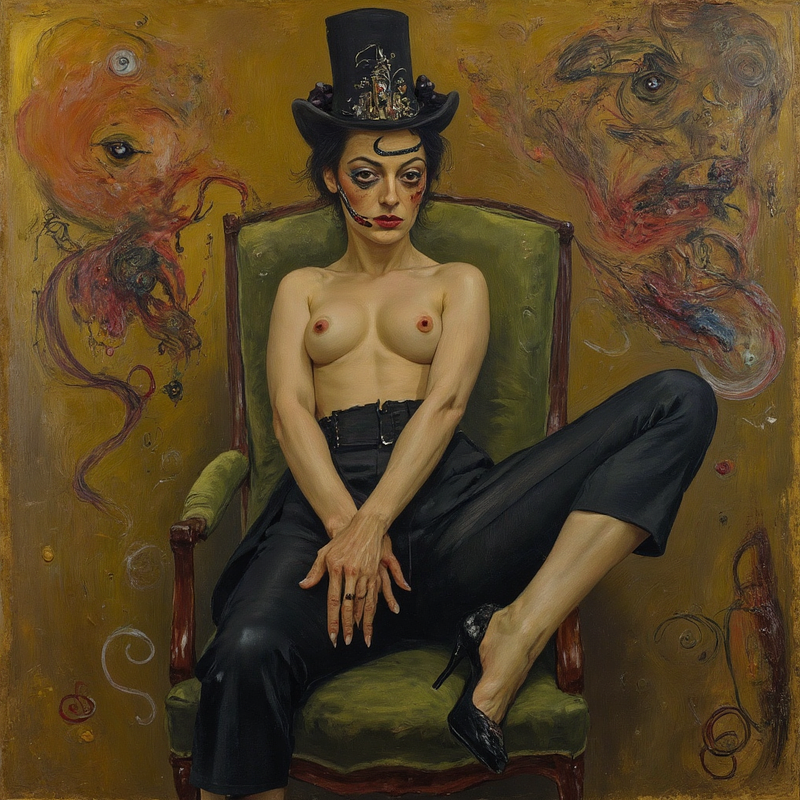


7 months ago
Abstract Full-Body Portrait of a Prostitute – Salvador Dalí (Late-Life Style, Singular Focus & Pure Surrealism) (Surrealism:1.7, Salvador Dalí late-life style:2.0, Dreamlike distortion:1.6, Hyperreal textures:1.5, Chiaroscuro contrast:1.4, Oil-painting brushstrokes:1.5, Organic fluidity:1.6, Metaphysical realism:1.4) A full-body surrealist portrait of a prostitute, painted in the unmistakable late-life style of Salvador Dalí, where dream logic dictates form and reality bends into its own subconscious reflection. She stands alone in the void, a lone figure frozen in motion yet melting into time itself. Her body is elongated but coherent, her limbs refined into one singular, fluid, organic motion, as if she is a sculpture made of half-formed candle wax, melting at the edges but never fully dissolving. Her face remains untouched by distortion, hyperreal and melancholic, eyes darkened with kohl, staring directly outward, unblinking, as if confronting time, fate, and the fabric of reality itself. A single strand of jet-black hair escapes from her carefully pinned curls, swaying in an invisible breeze. Her lips—painted a deep, blood-red—drip slightly at the edges, as if smeared by unseen hands, caught between seduction and sorrow. Her dress, a relic of the past, is a contradiction of luxury and decay, the hem transforming into thin wisps of smoke, curling and dispersing into the canvas. The fabric is stretched unnaturally, its folds elongating like the melted forms of Dalí’s classic clocks, one shoulder slipping in an eternal descent, never quite falling. The setting is an infinite, surreal landscape—a lonely street with no visible end, where shadows stretch longer than their owners, and the cobblestones appear to melt into liquid mercury. In the background, a large, antique pocket watch, twisted and partially submerged in the air, hangs frozen at an uncertain hour, its hands warped into elongated spirals. A single red rose, impossibly large and impossibly alive, hovers just behind her, its petals peeling away like fragments of forgotten love letters. The air feels thick, painted with visible brushstrokes, where light and shadow do not obey the laws of physics—instead, they bleed into one another, wrapping around her body in soft, liquid chiaroscuro, mimicking the curvature of a dream. She is not merely a woman but a symbol—of desire, of loss, of something slipping through time like sand through Dalí’s own fingers.

6 months ago
A romantic oil painting in a lush, painterly fantasy style, with thick impasto brushstrokes and glowing, cinematic lighting. Set along the Seine River at night, a couple stands close under glowing café lanterns, their foreheads touching gently, wrapped in a moment of quiet intimacy. The woman wears a flowing crimson dress, her hair cascading in soft waves, while the man in a dark suit holds her tenderly. The café glows warmly behind them, spilling golden light onto flower boxes bursting with scarlet geraniums and violet blooms. The cobblestones glisten from recent rain, reflecting the lanterns, moonlight, and colorful city lights dancing on the river’s surface. A full moon rises over the dreamy Parisian skyline, partially framed by leafy tree branches. The scene is emotionally rich, magical, and filled with warmth, passion, and nostalgic beauty — like a love story frozen in painted time. Use expressive texture, glowing reflections, and a soft, storybook atmosphere.

7 months ago
oil painting, portrait in the style of Helene Knoop An ethereal woman who embodies a poem of love and pain, with long, wavy blond hair covered by a flowing, deep crimson red veil, wearing a golden crown intricately studded with amber and red jewels. Her eyes are melancholic, full of emotion. She wears a dark red robe with gold accents reinforced like stars, torn in parts with dark shadows blending into the fabric. On her chest, a stylized heart beats, half gold, half dark. In the background, an abstract watercolor scene: on the left, golden tones with floating flowers; on the right, dark red and gray tones with raindrops like tears. Words in delicate calligraphy — "'LIGHT'", 'CLOUDS', 'PAIN', 'SMILE' — float around. Style: soft brushstrokes, vibrant colors, poetic and emotional atmosphere, high level of detail." portrait, fantasy art, ethereal"

5 months ago
((gritty, hyperrealistic painting:1.5)), ((Hulk and Superman locked in a brutal power struggle:1.5)), both hands clasped, fingers interlocked in a violent test of strength, muscles straining, tendons stretched to the limit. Superman, bruised, grounded, is down on one knee, his body twisting with resistance, arms trembling as he holds back the massive force bearing down on him. His blue suit is torn, his face bloodied, hair matted with sweat and soot, but his gaze is clear and defiant—no glowing eyes, only human resolve. The Hulk towers over him, full height—3 meters tall, 500 kilograms of brute muscle, drenched in sweat, skin streaked with grime and ash. His monstrous body looms with dominance, feet planted wide, both arms pressing down, veins bulging, face twisted in a roar of exertion. His skin cracks around his fists from the sheer pressure, saliva flying from his mouth as he snarls through clenched teeth. The ground beneath Superman’s knee is shattered, pressed inward by the weight. Shockwaves ripple through the dust, small stones hover in midair. The scene is dense with smoke, ash, and heat distortion, the ambient firelight casting flickering shadows over their bodies. Style: painted like an epic oil tableau—Caravaggio-like lighting, Repin’s anatomical drama, Beksiński’s apocalyptic ambiance. Every detail captured: grit on skin, blood at the lip, wrinkles in fabric, cracked stone, drifting embers, clenched fingers locked in struggle. Lighting: heavy chiaroscuro—low directional light from fires around them, long shadows falling across Superman’s face, rim lighting highlighting Hulk’s upper body, emphasizing the scale difference without diminishing the tension. Camera angle: low and close, from Superman’s left side, showing his knee pressed into shattered ground, arms lifted to hold off Hulk’s crushing weight. Hulk fills the vertical space, Superman dominates the emotional weight—a visual of pressure and refusal to yield. Art direction for Flux: – Hulk is 3m tall, 500kg, physically overwhelming, rendered with full weight and scale – Superman is human-scale, on one knee, but braced and locked in—the underdog with unbreakable resolve – Style: dark painterly realism, anatomical accuracy, no stylization, no superpowers shown – Textures: bruised flesh, torn cloth, cracked stone, sweat, grit, tension in the hands and faces – Environment: scorched battlefield, ambient smoke, sparks, fractured terrain, faint firelight – Theme: mythic struggle, physical scale vs inner will—no victor yet, only raw contest

4 months ago
(Primary Subject: Emotionally Expressive Android Woman with Dual-Layered Skin, Painted in Impressionist Classical Renaissance Style, 1.7 weight) — in the heart of a lush, sun-drenched garden overflowing with blossoms, an android woman stands quietly, her form captured in the painterly elegance of a Renaissance-era oil painting. Her body is sculpted and graceful, rendered with soft impressionist brushstrokes that blend into surreal detail—her figure radiant, yet ethereal, like a machine-angel frozen in time. Her “skin” is composed of two delicate, interwoven layers: The outer layer is smooth, reflective, and subtly fluid, shimmering with hints of pale pink, soft violet, and dusky gold, like liquid mercury caught in a sunset. It has the appearance of gently flowing molten glass, and catches the dappled garden light with painterly elegance. Beneath it, faintly visible through the translucent surface, lies a subdermal lattice—a softly glowing core of golden circuitry, like sacred geometry woven into synthetic muscle. It pulses faintly, like a slow heartbeat of light, giving her form an inner radiance, a soul made of signal (subtle luminous inner structure beneath transparent surface, 1.6 weight). She wears no armor, no exposed wires—only that liquid-smooth surface, glowing softly in the sun. A thin, continuous line of amber-orange light traces up the outside of her legs, over her hips, across her shoulders and arms, like a haloed signature etched into her form. Her visor-like faceplate—a curved golden-glass surface—reflects the garden’s warm light. Though faceless, her entire body language conveys profound emotion: one hand lightly touching her chest, the other extended gently toward a single open flower, as if remembering something. Her posture is soft, tender, almost melancholic—like a saint carved from future metal, lost in sacred thought. The garden blooms around her in classical beauty—roses, lilies, orchids, and surreal blossoms from impossible species. Sunlight pours through foliage in golden beams, casting her figure in a divine backlight. Petals drift in the air like thoughts. Her reflection shimmers faintly in a nearby pool. Rendered in the style of a classical oil painting—with visible brush textures, soft baroque lighting, volumetric haze, and subtle chiaroscuro across her form. The colors are rich and warm—sunset gold, floral crimson, blush pink, and soft lavender—interplaying with reflections in her skin like a moving canvas.

6 months ago
(Primary Subject: Emotionally Expressive Android Woman with Dual-Layered Skin, Painted in Impressionist Classical Renaissance Style, 1.7 weight) — in the heart of a lush, sun-drenched garden overflowing with blossoms, an android woman stands quietly, her form captured in the painterly elegance of a Renaissance-era oil painting. Her body is sculpted and graceful, rendered with soft impressionist brushstrokes that blend into surreal detail—her figure radiant, yet ethereal, like a machine-angel frozen in time. Her “skin” is composed of two delicate, interwoven layers: The outer layer is smooth, reflective, and subtly fluid, shimmering with hints of pale pink, soft violet, and dusky gold, like liquid mercury caught in a sunset. It has the appearance of gently flowing molten glass, and catches the dappled garden light with painterly elegance. Beneath it, faintly visible through the translucent surface, lies a subdermal lattice—a softly glowing core of golden circuitry, like sacred geometry woven into synthetic muscle. It pulses faintly, like a slow heartbeat of light, giving her form an inner radiance, a soul made of signal (subtle luminous inner structure beneath transparent surface, 1.6 weight). She wears no armor, no exposed wires—only that liquid-smooth surface, glowing softly in the sun. A thin, continuous line of amber-orange light traces up the outside of her legs, over her hips, across her shoulders and arms, like a haloed signature etched into her form. Her visor-like faceplate—a curved golden-glass surface—reflects the garden’s warm light. Though faceless, her entire body language conveys profound emotion: one hand lightly touching her chest, the other extended gently toward a single open flower, as if remembering something. Her posture is soft, tender, almost melancholic—like a saint carved from future metal, lost in sacred thought. The garden blooms around her in classical beauty—roses, lilies, orchids, and surreal blossoms from impossible species. Sunlight pours through foliage in golden beams, casting her figure in a divine backlight. Petals drift in the air like thoughts. Her reflection shimmers faintly in a nearby pool. Rendered in the style of a classical oil painting—with visible brush textures, soft baroque lighting, volumetric haze, and subtle chiaroscuro across her form. The colors are rich and warm—sunset gold, floral crimson, blush pink, and soft lavender—interplaying with reflections in her skin like a moving canvas.
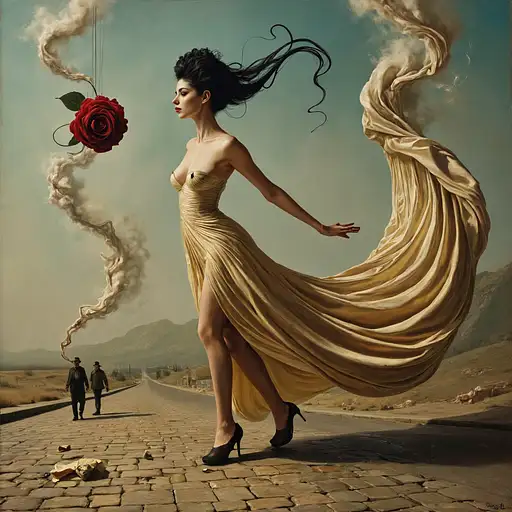
7 months ago
(Surrealism:1.7, Salvador Dalí late-life style:2.0, Dreamlike distortion:1.6, Hyperreal textures:1.5, Chiaroscuro contrast:1.4, Oil-painting brushstrokes:1.5, Organic fluidity:1.6, Metaphysical realism:1.4) A full-body surrealist portrait of a prostitute, painted in the unmistakable late-life style of Salvador Dalí, where dream logic dictates form and reality bends into its own subconscious reflection. She stands alone in the void, a lone figure frozen in motion yet melting into time itself. Her body is elongated but coherent, her limbs refined into one singular, fluid, organic motion, as if she is a sculpture made of half-formed candle wax, melting at the edges but never fully dissolving. Her face remains untouched by distortion, hyperreal and melancholic, eyes darkened with kohl, staring directly outward, unblinking, as if confronting time, fate, and the fabric of reality itself. A single strand of jet-black hair escapes from her carefully pinned curls, swaying in an invisible breeze. Her lips—painted a deep, blood-red—drip slightly at the edges, as if smeared by unseen hands, caught between seduction and sorrow. Her dress, a relic of the past, is a contradiction of luxury and decay, the hem transforming into thin wisps of smoke, curling and dispersing into the canvas. The fabric is stretched unnaturally, its folds elongating like the melted forms of Dalí’s classic clocks, one shoulder slipping in an eternal descent, never quite falling. The setting is an infinite, surreal landscape—a lonely street with no visible end, where shadows stretch longer than their owners, and the cobblestones appear to melt into liquid mercury. In the background, a large, antique pocket watch, twisted and partially submerged in the air, hangs frozen at an uncertain hour, its hands warped into elongated spirals. A single red rose, impossibly large and impossibly alive, hovers just behind her, its petals peeling away like fragments of forgotten love letters. The air feels thick, painted with visible brushstrokes, where light and shadow do not obey the laws of physics—instead, they bleed into one another, wrapping around her body in soft, liquid chiaroscuro, mimicking the curvature of a dream. She is not merely a woman but a symbol—of desire, of loss, of something slipping through time like sand through Dalí’s own fingers.

4 months ago
[Image Type: Ultra-realistic color photograph / Highly detailed realistic oil painting / High-resolution digital portrait] of Marie Curie. Facial Details: Face Shape: Oval-shaped, with slightly prominent cheekbones and a soft jawline. Skin Tone: Fair complexion with a subtle rosy undertone, showing natural skin texture and pores. Fine expressive lines are visible around the eyes and mouth, and subtle horizontal lines on the forehead (especially in older depictions). Hair: Color: A blend of light grey, silver, and pale blonde, with remnants of subtle underlying light brown strands. In younger depictions, the hair would be light brown or dark blonde. Style: Neatly gathered into a loose bun, chignon, or "messy updo" at the back of the head, with soft, wispy strands framing the forehead and temples. In younger images, the hair might be fuller around the head or styled upwards. Eyes: Color: Pale light blue or blue-grey, with a calm, discerning, and deep gaze, reflecting intelligence and seriousness. Shape: Almond to slightly round, with slightly prominent upper eyelids. Eyelashes and Eyebrows: Sparse eyelashes; eyebrows are thin to medium, naturally arched, and light-colored (tending towards grey/blonde), neatly groomed. Nose: Straight, medium-sized, with a slightly rounded tip, defined by soft shadow lines. Mouth and Lips: Medium-full lips, natural rosy-pink color, often closed with a calm or serious expression. Fine lines may appear around the mouth (especially in older depictions). Chin: Rounded and soft, proportionate to the face shape. Distinguishing Features: A subtle dimple on the chin may be present. Her facial expression conveys focus and deep thought. Body and Clothing Details (if more than the face is included): Body Build: Neck, shoulders, and upper chest are visible. Clothing: Often depicted in simple, practical attire typical of her era, such as: A dark-colored (black, navy, or dark brown) dress or jacket made of a dense fabric. Details like a high white collar, a decorative collar (as in younger photos), or simple lace embellishments on the shoulders or sleeves may be present. A simple, thin necklace with a small pendant (could be a locket or a bar-shaped pendant). Background and Lighting: Background: Simple, often a plain neutral-colored wall (grey, beige, light brown) or a softly blurred, indistinct background, with gentle color gradients providing depth without distraction. Lighting: Soft, even lighting illuminating the face, with very subtle shadows highlighting features without being harsh. The light source might be from the front or slightly to one side. Overall Mood/Feeling: Calm, serious, contemplative, and confident expression, reflecting her intelligence and profound thinking. ```

8 months ago
Epic dark fantasy oil painting capturing the raw, mythological power of Thor, the Norse god of thunder. The setting is a wild, snowy Scandinavian landscape engulfed in a fierce blizzard, with snow whipping across the scene in chaotic gusts. The stormy sky is thick with heavy clouds, nearly obscuring the distant mountains, and cast in deep, moody blues and grays. Thor is seen from a low angle, making him appear larger-than-life and truly god-like, towering over the viewer with an aura of unstoppable strength. His powerful, muscular frame is emphasized by his pose, legs planted firmly in the deep snow as he raises Mjölnir, his legendary battle hammer, high into the turbulent sky. He is fierce and resolute, his hair and fur-lined cloak whipping wildly in the freezing wind. A massive bolt of lightning crashes down from the storm clouds, connecting with Mjölnir and bathing Thor in a blazing, blue-white glow that pierces through the blizzard. The intense light highlights his rugged features and casts dramatic shadows across his face and armor, giving him a godly, otherworldly presence. The lightning arcs around him, crackling with raw energy as snow and ice are blasted into the air from the sheer force. Thor’s attire is inspired by traditional Norse mythology, with a thick fur cloak, leather armor reinforced with metal, and sturdy boots fit for a winter warrior. His gaze is fierce, and his entire posture exudes strength and defiance against the raging storm. The color palette is cold and intense, dominated by icy blues, sharp whites, and deep shadows. The lightning illuminates Thor in a spectral light, creating a sharp contrast against the darkness of the blizzard. Snow swirls violently in every direction, caught in the powerful light, adding dynamic movement and depth to the scene. Every detail is meticulously rendered: the rippling muscles, the coarse texture of Thor’s fur cloak, the chaotic streaks of lightning, and the fierce, swirling snow. The composition conveys the raw, untamed power of the Norse god, capturing the viewer’s attention with the overwhelming force of mythic heroism and natural fury.
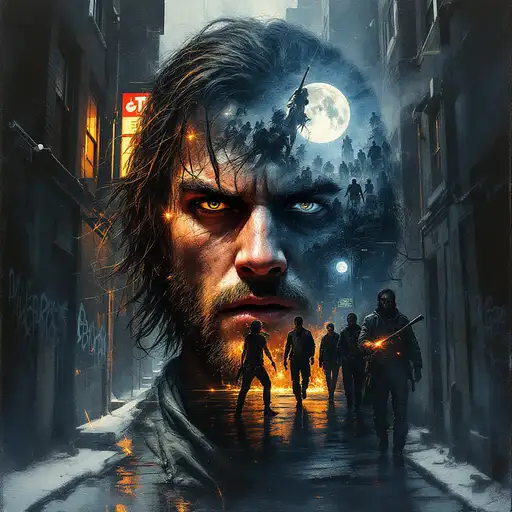
6 months ago
Craft a dynamic and emotionally charged oil painting that uses the double exposure technique to capture the raw energy, unity, and struggles of The Warriors. The central figure should be one of the Warriors, such as Swan, his face half-translucent and fierce, embodying both the individual and collective spirit of the gang. His expression should be filled with determination and defiance, while his figure dissolves into the gritty, chaotic streets of 1970s New York City—dark alleys, graffiti-tagged walls, and the stark silhouettes of neon lights. His features should bleed into the urban landscape, as though he is both a part of the city and a symbol of rebellion against it. Inside his form, a web of interconnected images from the Warriors' journey should emerge: the haunting image of the baseball bat-wielding Rogues, the fire-lit glow of the moonlit escape across subway tunnels, and the strong camaraderie of the Warriors themselves, seen through their shared struggles and brotherhood. The double exposure should seamlessly integrate these elements into his figure, illustrating the tension between individual survival and the unbreakable bond of the gang as they face overwhelming odds together. The color palette should reflect the gritty urban feel of the film, with cool blues, grays, and blacks contrasted with the neon oranges, reds, and greens of the streetlights and graffiti. The atmosphere should feel electric, filled with an undercurrent of danger, defiance, and unspoken loyalty. The oil painting should evoke a sense of movement—like a snapshot of the Warriors running through the night, the harsh cityscape blurring into their form, and the struggle against the forces that threaten to tear them apart. This double exposure composition should not only explore the Warriors' journey through the hostile streets but also the emotional and psychological depth of their fight for survival and unity. The contrast between the rawness of their environment and the bond they share should be at the heart of this painting, encapsulating the spirit of The Warriors as a timeless symbol of resilience and brotherhood.

8 months ago
oil painting, cardboard like silhouette of a sad wolf, head down, low tail, inside wolf silhouette, outline of majestic oak forest with dawn colors, graded top to bottom. dramatic background, abstract, painting pollock style, large brush strokes, dramatic scenery, hazy, dead trees, dead nature, shades of gray, big factories, big chimneys, hunters, urban traffic, nuances of grey, paint stripes, big and small paint drops.

8 months ago
A meticulously detailed, hyper-realistic oil painting featuring a captivating boho woman with striking green eyes and long, wavy brunette hair. Her fair complexion is delicately adorned with freckles, and her contemplative expression captures a moment of deep thought. She wears an off-shoulder linen dress in an eclectic mix of traditional attire. The richly patterned maxi skirt, flowing blouse, and layered necklaces with intricate designs create a tapestry of bold colors and patterns,, its deep neckline drawing attention to her elegant necklace and an array of boho jewelry. The painting's background is muted, allowing her to stand out, with warm light casting golden highlights on her face and body. Shadows are carefully rendered to create depth, and the cool tones add contrast to the warm lighting. Dramatic chiaroscuro effects emphasize mood and intensity, while the artist's skillful brushstrokes bring depth and texture to the piece. Drawing inspiration from artists like Norman Rockwell, Steve H, poster, painting, 3d render, dark fantasy, photo, illustration, fashion, cinematic, vibrant By Sasan

8 months ago
A meticulously detailed, hyper-realistic oil painting featuring a captivating boho woman with striking green eyes and long, wavy brunette hair. Her fair complexion is delicately adorned with freckles, and her contemplative expression captures a moment of deep thought. She wears an off-shoulder linen dress in an eclectic mix of traditional attire. The richly patterned maxi skirt, flowing blouse, and layered necklaces with intricate designs create a tapestry of bold colors and patterns,, its deep neckline drawing attention to her elegant necklace and an array of boho jewelry. The painting's background is muted, allowing her to stand out, with warm light casting golden highlights on her face and body. Shadows are carefully rendered to create depth, and the cool tones add contrast to the warm lighting. Dramatic chiaroscuro effects emphasize mood and intensity, while the artist's skillful brushstrokes bring depth and texture to the piece. Drawing inspiration from artists like Norman Rockwell, Steve H, poster, painting, 3d render, dark fantasy, photo, illustration, fashion, cinematic, vibrant By Sasanexplored environment.

6 months ago
An award-winning oil painting in 8k ultra-resolution, rendered in the classical style of Baroque masters like Johannes Vermeer, Peter Paul Rubens, Artemisia Gentileschi, Caravaggio, and Rembrandt. The scene features a graceful woman holding a delicate theatrical mask mid-performance, her demeanor poised and expressive. She stands bathed in golden light, surrounded by dramatic shadows that lend a theatrical presence and emotional tension. Her costume is elaborate, featuring baroque embroidery, fine silk, and layered textures captured through masterful oil glazing. The composition is ornate and emotionally rich, blending warm luminous colors and deep, rich shadows with remarkable realism and detail. Subtle musical cues are implied through the motion of her hand and the flowing of her costume, as if she is caught in a moment of dramatic operatic expression.
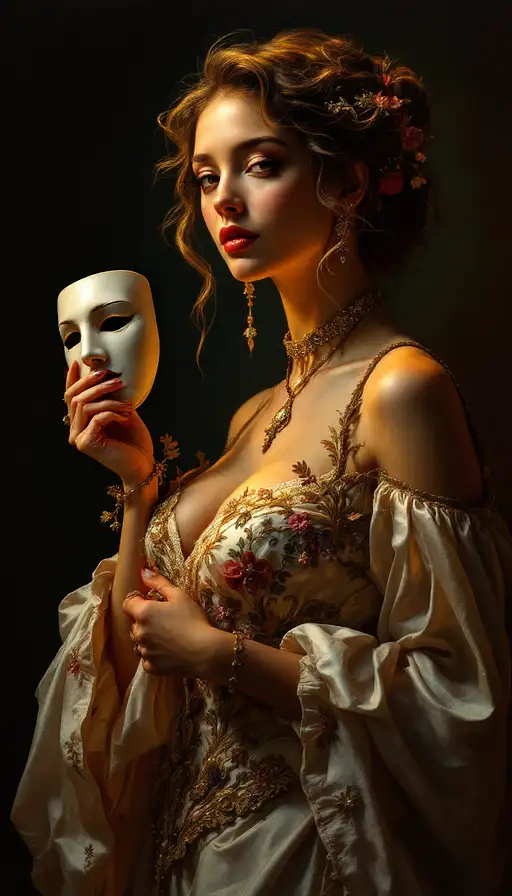
6 months ago
An award-winning oil painting in 8k ultra-resolution, rendered in the classical style of Baroque masters like Johannes Vermeer, Peter Paul Rubens, Artemisia Gentileschi, Caravaggio, and Rembrandt. The scene features a graceful woman holding a delicate theatrical mask mid-performance, her demeanor poised and expressive. She stands bathed in golden light, surrounded by dramatic shadows that lend a theatrical presence and emotional tension.

6 months ago
Create a breathtaking and evocative double-exposure oil painting that beautifully captures the profound bond between humanity and nature, using the iconic imagery of Gorillas in the Mist. The painting should focus on the rich emotional depth of the gorillas and the lush, mist-covered landscape of the Congo, blending these elements in a way that symbolizes both the mystery of the jungle and the majesty of these endangered creatures. The central figure of the painting should be a majestic gorilla—painted with intricate detail to reflect the animal’s strength, intelligence, and vulnerability. Its face should be filled with quiet intensity, wisdom, and an almost human-like quality, conveying its deep emotional resonance. The gorilla’s eyes should be the focal point, expressive and full of emotion, perhaps suggesting the struggle for survival, a call for preservation, or an understanding of the delicate balance between nature and human interference. The double-exposure effect should allow the environment to emerge within its form, creating a stunning fusion of the animal and its misty, green habitat. The mist itself should flow through the gorilla’s body and face, creating an ethereal atmosphere that invokes the deep, mysterious quality of the jungle. Soft, translucent layers of paint should be used to capture the wisps of fog, blending into the contours of the gorilla’s powerful form. The mist should not only symbolize the natural environment but also reflect the presence of the unseen—the unseen dangers, the spiritual connection between the gorilla and the jungle, and the ongoing battle to protect these creatures from extinction. Surrounding the gorilla, the dense, vibrant foliage of the rainforest should be depicted in rich, lush greens, with hints of deep browns and subtle touches of vibrant wildflowers. Vines, leaves, and branches can emerge from the mist, merging with the gorilla’s figure, creating the sensation that it is a part of the jungle, and vice versa. The interplay of light and shadow within the leaves and the mist should evoke a sense of both serenity and mystery, with rays of sunlight filtering through the trees, casting soft, glowing highlights on the gorilla’s fur and the surrounding vegetation. The background should suggest both the wildness and fragility of the gorilla’s environment. Darker shades of green and brown can illustrate the dense canopy, while lighter, misty shades should evoke the sense of isolation and vulnerability. In the double-exposure technique, glimpses of the jungle’s wildlife—perhaps a subtle hint of a bird or a distant silhouette of another gorilla—can appear within the mist, symbolizing the delicate interconnectedness of life within the forest ecosystem. The color palette should shift between dark and light—rich earth tones that evoke the depth and complexity of the jungle, paired with the light, airy mist that suggests hope, fragility, and the need for preservation. The mist itself should be painted with fluid brushstrokes that contrast with the more textured rendering of the gorilla, creating a sense of life and motion in both the animal and its environment. This painting should not only represent the beauty and majesty of the gorillas but also serve as a powerful call for conservation. Through the double-exposure technique, it should blur the lines between the animal and its habitat, illustrating the inseparable bond between the two and the urgent need to protect these magnificent creatures from the encroaching threats of human activity. The result should be a masterpiece that blends realism with abstraction, capturing the raw, emotional beauty of the gorillas, the mystique of their environment, and the call for preservation. The viewer should feel immersed in this tranquil yet fragile world, experiencing the emotional weight of the subject matter while marveling at the intricacy and beauty of the painting itself

6 months ago
cinematic film still professional 3d model anime artwork concept art a masterpiece oil painting, comic comic Dreamscape an muscular Lord hanuman (monkey faced god) holding The mace is a heavy, intricately designed weapon with a large, rounded head studded with blunt, golden spikes, its surface engraved with glowing Sanskrit symbols that pulse with divine energy, and a sturdy handle wrapped in red and gold cloth for grip, falling backwards into the cosmos, looks like something out of a science fiction anime . Surreal, ethereal, dreamy, mysterious, fantasy, highly detailed . highly detailed, psychedelic, vibrant, highly detailed . digital artwork, illustrative, painterly, matte painting, highly detailed, . key visual, vibrant, highly detailed . octane render, highly detailed, volumetric, dramatic lighting, glossy, lense flare, shiny surface, reactor core, heavy armor, black and fire orange color scheme, aggressively, on cosmic fire . shallow depth of field, vignette, highly detailed, high budget, bokeh, cinemascope, moody, epic, gorgeous, film grain, grainy

7 months ago
oil painting, Helene Knoop style portrait An ethereal woman who embodies a poem of love and pain, with long, wavy blonde hair covered by a flowing, deep blue veil, wearing a golden crown intricately studded with amber and blue jewels. Her eyes are melancholic, full of emotion. She wears a dark blue robe with gold accents reinforced like stars, torn in parts with dark shadows blending into the fabric. On her chest, a stylized heart beats, half gold, half dark. In the background, an abstract watercolor scene: on the left, golden tones with floating flowers; on the right, dark blue and gray tones with raindrops like tears. Words in delicate calligraphy — 'light', 'clouds', 'pain', 'smile' — float around. Watercolor style, soft brushstrokes, vibrant colors, poetic and emotional atmosphere, high level of detail." portrait, fantasy art, ethereal"

6 months ago
A masterful double-exposure oil painting blending realism with metaphysical symbolism, inspired by Stephen King's Revival. In the foreground, a weathered man stands solemnly, eyes uplifted, his face marked by time, faith, and loss. His silhouette forms the canvas for a second, ghostly image within: a dramatic vision of a storm-wracked sky above a shadowy revival tent, lightning forking downward like divine judgment.
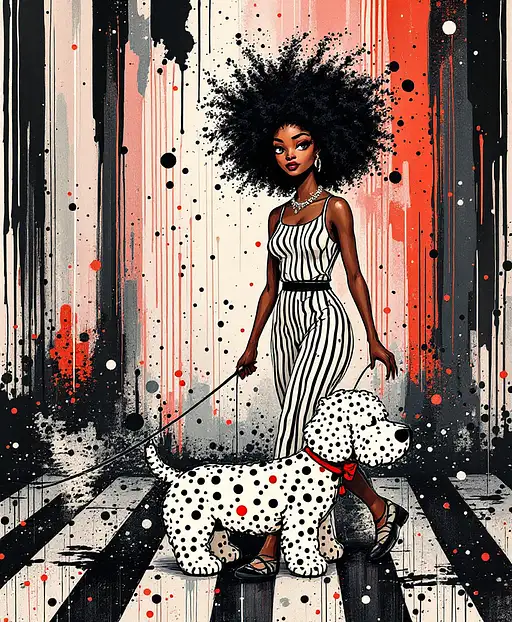
8 months ago
Black Woman, big Afro hair, striped walking a dotted doodle dog with exaggerated features. (((Coarse, impasto strokes))) of oil paint add texture and depth to the piece, while ink splatters and drips create a sense of dynamic energy. The entire scene is set against a vast, 16K stripe and dots background. The color scheme is a masterful blend of dark complementary hues, evoking the subtle, nuanced palette of traditional Japanese art, with bold, expressive brushstrokes, blended with, mixed-media like Takashi Murakami, David Hockney, Alberto Giacometti and Camilla d'Errico
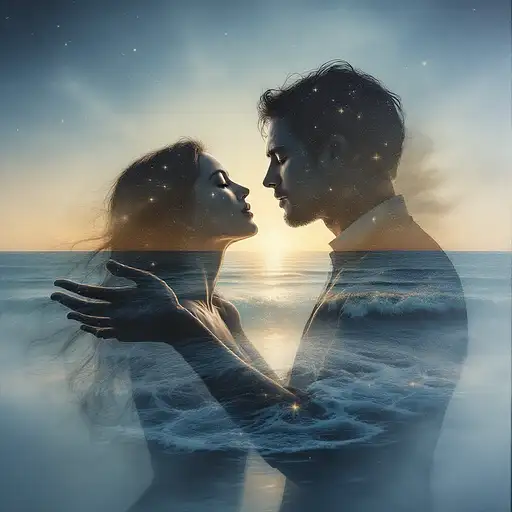
6 months ago
An award-winning double exposure oil painting masterpiece inspired by the timeless emotion of Unchained Melody. The central figure is a solitary, longing lover—either male or female—reaching out with outstretched hands toward an unseen, distant other. Their expression is one of deep yearning, eyes closed as if lost in a memory or a dream. Within their form, the double exposure reveals an ethereal landscape of two souls intertwined by invisible threads—silhouettes of the lovers, their faces fading into the mist of an oceanic horizon or beneath a sky full of stars. The scene within the figure’s outline unfolds like a story of longing and connection: a shoreline bathed in the soft glow of moonlight, the waves crashing gently as they reflect the emotions of love’s deep, unbreakable bond. Light swirls around the lovers, enveloping them in a soft, golden glow, as if their love exists in a timeless, almost celestial plane. The soft, translucent waters of the ocean appear to reflect memories—perhaps a distant touch, a first kiss, or a shared moment under the stars. The palette evokes the timeless nature of the song: deep midnight blues, soft silvers, warm golds, and the iridescent glow of moonlight on the water, contrasted with the figure’s soft, muted tones—suggesting a vulnerability and fragility. Brushstrokes are delicate and layered, allowing the two worlds—the figure and the landscape—to blend seamlessly, creating a visual flow that captures the eternal pull of love, even across time and space. Themes of separation, devotion, longing, and the eternal connection between two souls are explored with a sense of yearning and passion, making this painting an intimate tribute to the enduring power of love, as expressed through Unchained Melody.

9 months ago
oil painting, cardboard like silhouette of a wolf, head down, low tail, dramatic background, Pollock like factories, big chimneys, hunters, urban traffic, background nuances of grey, paint stripes, big and small paint drops, painted on wolf silhouette, outline of majestic forest, blues and greens colors of dawn graded top to bottom,
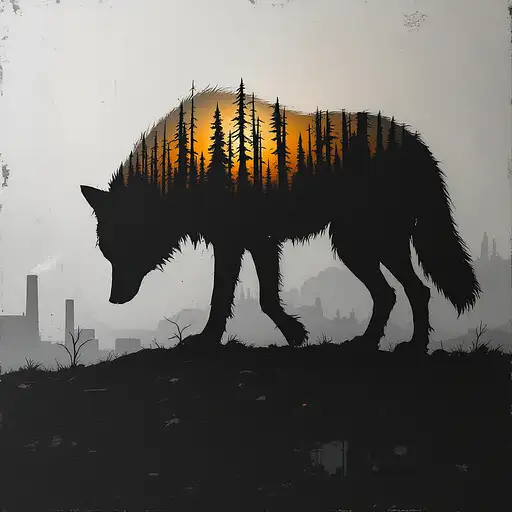
8 months ago
oil painting, cardboard like silhouette of a sad wolf, head down, low tail, inside wolf silhouette, outline of majestic forest with dawn colors, graded top to bottom. dramatic background, painting pollock style, dramatic scenery, hazy, dead trees, dead nature, shades of gray, big factories, big chimneys, hunters, urban traffic, nuances of grey, paint stripes, big and small paint drops.
